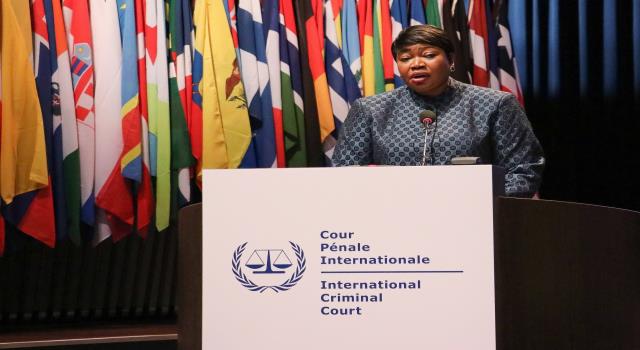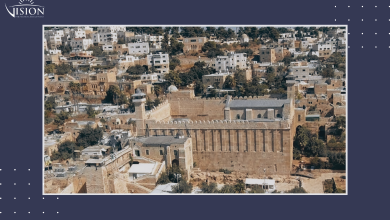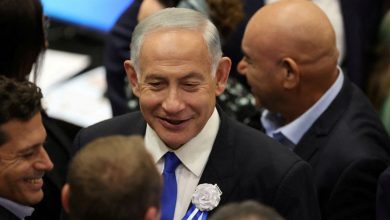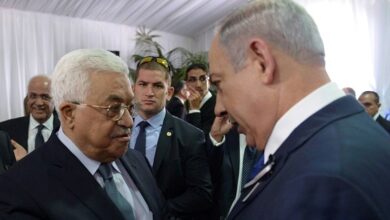Palestine and the Decision of the International Criminal Court on Launching an Investigation About the “Israeli” Occupation Crimes

Palestine and the Decision of the International Criminal Court on Launching an Investigation About the “Israeli” Occupation Crimes
How did the idea of resorting to the International Criminal Court ]Later will be known as ICC[ begin?
The idea evolved after the “Israeli” war over the Gaza Strip in December 27th.2008 as a result of the heinous crimes committed by the “Israeli” occupation in that war. These crimes might be considered as war crimes, crimes against humanity, genocides against civilians and children in the Gaza Strip. By such crimes, “Israel” violates Article (4) of Geneva Convention, which establishes the protection of civilians during armed conflicts. These crimes are considered within the jurisdiction of the ICC based on Article (5) of Rome Statue of the International Criminal Court, especially after the “Israeli” occupation used internationally prohibited weapons such as depleted Uranium and white phosphorus. Human Rights Watch accused “Israel” of using phosphorus weapons, bombing UNARWA’s centers and schools, which were refuges for thousands of civilians, children, and women, as they were safe and protected. This in turn led to tens of martyrs of children and civilians in the refuges centers. In addition, the genocides of whole families removed from the civilian documents, as well as the huge violations committed by “Israel” in the West Bank and the eastern part of Jerusalem, such as frequent executions of Palestinian civilians and the illegal expansion of settlements which is increasing day after day. These are violations of the International Humanitarian Law and the International Law of Human Rights.
After Operation Cast Lead (as named by “Israel” in 2008/2009), the Palestinian Authority filed almost 400 complaints for the prosecutor of the court in ICC. Some of which were in groups, and others were individuals. However, they have not been returned and no consideration was given. In January/ 2009, Minister of Justice Ali Khashan presented an official announcement based on Article 12-3 for the public prosecutor Luice Okambo about the crimes the “Israeli” occupation is committing against the Palestinian people. The public prosecutor Okambo raised an argument on the situation in Palestine as a state in the international law. He said that the official claim presented by the Minister of Justice is not in the place of jurisdiction of ICC, as Palestine did not join the Rome Statute, which is considered: Rome Statue of ICC. After 3 years of deliberations, and in April 4th, 2012, Okambo asked for an adjustment of the Palestine’s membership before the United Nations. The Palestinian Authority made hard efforts and in November 29th. 2012, following decision “19- 67” with a majority of 138 votes of the General Assembly, Palestine becomes Non-member UN State with observer status. With this recognition, the legal position of Palestine becomes different. It has the legal personality, which makes it able to sign on the international agreements in the same manner as other states. Here is the main turning point in favor of the Palestinian state and the people, and the foundation stone, which make it capable, as a state with legal personality, of signing the Rome Statute. And in this connection, it becomes a member in ICC, which is now authorized to stand before the court and request for holding the “Israeli” occupation accountable for the crimes they committed against the Palestinian people.
In January 2nd. 2015, Palestine signed the Rome Statute.to officially be April 2015, a member- state in ICC. Since this date the Palestinian efforts cooperated represented by the supreme national committee, legal institutions to prepare the required files to hold the “Israeli” occupation accountable and internationally responsible for, before the ICC, its crimes against the Palestinian people. Indeed, such efforts provided the announcement by the public prosecutor of ICC Fato Binsoda in January 20th. 2019 the beginning of the investigations regarding the excessive violations committed by the Israeli occupation in the Palestine.
The Role of the Higher National Committee in Going to ICC
The higher national committee was established to follow-up with the ICC, based on a presidential decree number (3) of 2005. Saeb Erkat, which consists of 40 members. One of the tasks of the committee is preparing documents and files that Palestine will present to the ICC. The national committee should undertake the necessary consultations with the ICC, other local and international organizations, advocates and legal companies to plead the Palestinian people before the ICC. Moreover, this committee monitors the communication with civil society, local and regional human rights institutions and also is responsible for setting a comprehensive media plan that includes the tasks assigned to it.
The national committee contracted with a legal firm which consists of a team of international experts to follow-up with the legal procedures before the public prosecution and represent the State of Palestine before the ICC. The National Committee also formed a national investigation committee to investigate in all of the complaints regarding the Palestinian resistance violations of the rules of the International Humanitarian Law and the International Law of Human Rights in order to avoid putting the victims in the position of accusation, as the preliminary study that is conducted by the public prosecutor includes the investigation on whether the national authorities have carried out investigations, or have begun prosecutions in cases under court consideration, and this, according to Article (17) of the Rome Statute, in order to ensure the application of the principle of complementarity between the national judiciary and the ICC. It should be noted here that the statement issued by the United Nations fact-finding committee on the 2014 war indicated that accountability on the Palestinian side was totally inadequate.
In this regard, Issam Younes, a member of the national committee to follow-up with the ICC said, “This step is crucial for the history of the Palestinian people. It is an important step on the long journey of justice. Since Palestine became a non-member state of the UN, it has had the legal personality that enables it to adhere to the Rome Statute, so the court can investigate in what is committed of war crimes against humanity in the Palestinian Territories. That was already done by the State of Palestine on December 31st , 2014, and the efforts exerted by the Palestinian Authority and human rights institutions have played a huge role in creating progress, leading to the decision of the Court’s Prosecutor to announce the completion of the preliminary examination phase and moving to the investigation phase, after consideration of the mandate Spatial court in the Palestinian territories.”
Younes adds that the high Supreme National Committee for following- up with the court includes in its membership different types of the Palestinian political and official institutions, human rights institutions and legal personalities. The committee provided political, national, and compatible cover to go to the court. It also tried to put the efforts together in the first period of presenting the file to the court, as the State of Palestine presented number of memorandums, as well as the Palestinian human rights’ organizations during 2015- 2016 presented another number of memorandums to the court.
As for some of the obstacles that the Supreme National Committee encountered is the variety of the background of members’; no legal backgrounds for some of them but political backgrounds, no extensive experience in the political profession of courts and the adjudication mechanisms before the ICC, and that not all members are meeting periodically. Issam Younes believes that the role of the national committee is not over yet, as there is a great responsibility on other official institutions of the State of Palestine ,such as the Ministry of Foreign Affairs, Public Prosecution, human rights institutions to put the efforts together for a productive coordination with the office of the public prosecution and provide it with the required evidence and prepare witnesses, victims to provide their testimonies before the court.
The Role of the Ministry of Foreign Affairs
In August 3rd. 2015 the Palestinian Minister of Foreign Affairs Riyad al-Malki submitted legal memorandum for the public prosecutor and her office’s members in the court, which includes the Israeli violations against the Palestinian people. It includes three files: the huge violations committed by the occupation’s authorities during the war on the Gaza Strip in 2014, the ongoing crime of building settlements in the West Bank, the violations against the Palestinian prisoners in the occupations’ prisons. In October 20th 2015, al- Malki submitted a supplementary legal memorandum for the previous one. In addition, the Palestinian human rights organizations submitted three memorandums for the court in 2015- 2016. Based on these steps, the public prosecutor Fato Binsoda started the preliminary studying process.
In addition to the memorandums, the Minister of Foreign Affairs acquainted the Public Prosecutor on the occupation attacks, the serious situation in the occupied Palestinian territories and the increase of the “Israeli” attacks. This requires the end of the preliminary study and moving to the period of opening an investigation regarding the occupied Palestinian territories to facilitate the trial of those who committed these crimes, end of impunity and the absence of justice. The Minister of Foreign Affairs confirmed his readiness to continue the cooperation with the office of the public prosecutor and providing her with the entire required documents and information.
The Palestinian Ministry of Foreign Affairs welcomed the decision of the public prosecutor Fato Binsoda to open an investigation and announced that it is acquainted with the public prosecutor’s request from the ICC Pre- Trial Chamber issuing a decision on the regional competence of the State of Palestine. The Minister of Foreign Affairs al-Malki said that opening an investigation is considered as the first decision that the public prosecutor made since her announcement about the beginning of the preliminary study in January 2015. This reflects her try and serious intention in opening criminal investigation in the Palestinian cause. The Ministry of Foreign Affairs confirmed that Palestine will participate in the judicial procedures which will be in the ICC, to ensure that the territorial jurisdiction is clearly settled, based on the international law. The Ministry of Foreign Affairs of the State of Palestine claimed the necessity of issuing urgent judgment from the ICC Pre- Trial Chamber in accordance with the identified timeframe in the ICC Practices Guidelines. This in turn makes the public prosecutor able to move forward in opening a criminal investigation without additional delay.
The Essence of the Decision of the ICC’s Prosecutor and its Implications on the Situation in Palestine:
Since January 16 2015, the situation in Palestine has been under a preliminary examination, to ensure with determination that all statutory criteria under the Rome Statute have been met to open an investigation. Accordingly, the ICC Prosecuter, Mrs. Fatu Bensouda, issued a statement in December 20th , 2019, to proceed with an investigation into the situation in Palestine regarding possible Israeli occupation crimes against the Palestinian People, is an explicit personal confession that there are grave violations of international humanitarian law and human Rights that require opening an investigation and that fall within the jurisdiction of the ICC.
Bensouda couldn’t have taken such a decision without having substantial facts and laws that enable her to defend it, after keeping the case ongoing in the preliminary examination for over four years, especially with the strong violent Israeli and U.S. objection to it, which what happened immediately after the announcement of the decision.
The Israeli Response to the Criminal Court’s Decision and the Obstruction of the International Investigation
The Israeli reaction to it was to try to obstruct the international investigation. The Israeli prime minister Benjamin Netanyahu accused the ICC Prosecutor Fatu Bensouda of being “anti-Semitic” and considered her decision to be a dark day for truth and justice. And he accused Bensouda of turning the ICC into a political tool to delegitimize Israel, the occupying power. The U.S. Secretary of State, Mike Pompeo, stated that the U.S. firmly opposes this decision and any other action that seeks to target Israel unfairly.
Parallel to that, the Israeli newspapers launched a campaign to defame the image and obstruct the work of the ICC, including defaming the image of ICC Prosecutor by recalling her professional history, when she used to work as a Prosecutor in her homeland Gambia, under the rule of the former tyrant regime of Yehya Gambia, indicating that she remained silent when human rights violations were committed by the regime and that she became a human rights activist only after she was fired by the regime. All of which is in an attempt to undermine the legitimacy of the court. In addition, the Israeli official discourse accuses the ICC of hypocrisy.
The Israeli newspaper, Israel Hayum, highlighted that both the judicial and political levels in Israel have started to look into ways to confront Bensouda’s decision. It also highlighted that the first session of the ministerial cadre, formed from the ministry of justice, the ministry of foreign affairs, the national security council, was held to look into ways to confront the court’s decision, after admitting that Israel is facing a new situation in all of its dealings with the ICC which has been following Israel’s actions on the ground for a decade. During that session, they adopted a strict policy against the ICC, including the complete boycott of the court, banning its employees and delegates from entering “Israel”, revoking their visas and imposing pressure on Israel’s allies to halt all funding to the ICC.
The Investigation Before the Criminal Court and the Next Step
Palestine submitted to the ICC three main cases: the settlement enterprise, the war on Gaza, and the Palestinian prisoners in Israel. If the Prosecutor’s office opens an investigation into those cases, the State of Palestine, as a member of the court since April 1st 2015, cannot send requests to the Prosecutor to look into certain cases while ignoring other ones. For instance, the Prosecutor will not accept restrictions that aim at preventing it from prosecuting Palestinians. The ICC will look into all violations that fall within its jurisdiction in the Palestinian-Israeli context, since July 13th ,2014.
The office of the Prosecutor is examining the issues of jurisdiction and admissibility and based on the available evidence, it will determine which cases it will investigate that fall within the jurisdiction of the ICC in the Palestinian territory. The office of the Prosecutor will take into account the gravity of the cases and their relation to actions that are inconsistent with international rules. Additionally, its ability to follow up on the case until the end, starting with collecting the evidence, and finally bringing the suspects before the court.
Harvard professor Alex Whiting, who worked at the Prosecutor’s office said that everything is based on strict balances between principles and reality.
The Pre-Trial chamber is currently studying the status of Palestine as a state and the territorial jurisdiction of the court. Accordingly, if the court’s decision to commence the investigation is a positive one, the security council can postpone the investigation or the prosecution for 12 renewable months in accordance with Article (16) of the Rome Statute; unless an issued decision is adopted based on chapter 7 of the United Nations Charter and supported by minimum 9 member states without a veto. Chapter 7 was invoked twice during resolutions 1487 and 1422, which gave immunity to UN peace keeping missions from countries that are not parties to the Rome Statute. If the Pre-Trial chamber decides not to open an investigation, the Prosecutor has the right to renew its request based on new realities in accordance with the Rome Statute.
Accordingly, the High National Committee, the relevant human rights organizations, the Palestinian leadership, and relevant parties should take the following steps:
– Call on the Pre-Trial chamber judges to stand up for Palestinian victims by giving the ICC Prosecutor the required legal authorization by a majority of its members, to enable her to commence the preliminary investigation into crimes committed in the occupied Palestinian territories.
– Call on member states of the Rome Statute and UN human rights institutions to support Prosecutor’s decision.
– It’s essential for the Palestinian Ministry of Foreign Affairs to invest in its membership in the executive office of the Assembly of States parties to the ICC, to call on active players to grant the Prosecutor with the required judicial authorization, to enable her to immediately open an investigation into the Israeli occupation crimes in the occupied Palestinian territories.
– All relevant members, the victims and their relatives, shall be completely ready to deliver their testimonies and the evidence they have to help the Prosecutor and her team in the investigation.
Conclusion:
The Advantages of and Obstacles to the Decision
The advantages
– The decision is considered as a victory to Palestinian efforts since 2009, and is an international recognition that Palestine is a State with a legal character, which enables it to litigate before international courts.
– The decision reaffirms that Palestine is an occupied state and suffers from grave violations, war crimes, and crimes against humanity committed by Israel and that all of these crimes fall within the jurisdiction of the ICC.
– The decision reaffirms that the state of Palestine takes legal and diplomatic means to defend its people and hold Israeli leaders accountable for their crimes before the ICC which is considered as a symbol for justice.
– The decision is considered as a legal deterrence to the occupying power, Israel, and it reaffirms that any violation of the rights of the Palestinian people is considered a reason for criminal prosecution to the leaders of the occupation before the ICC.
Obstacles to the Decision:
– The litigation before the court is considered time consuming and can exceed 10 years. Thus, there is a possibility of impunity of criminals for many reasons.
– Israel’s decision not to cooperate with the court is considered a real impediment to the Prosecutor’s ability to investigate the complicated cases relevant to Israel’s acts of aggression in the Gaza Strip and the West Bank.
– The ICC receives funding from major countries such as, Germany, France, and the USA. The latter is Israel’s strongest ally, which called on states to cut funding to the ICC.
– If an investigation is opened, there is a possibility to postpone it or stop it for contradicting considerations related to justice, stopping crimes, the responsibility of protecting witnesses, all of which is in accordance with Article (53)/(1) of the Rome Statute.
– The ICC’s jurisdiction includes all grave violations committed in the occupied Palestinian territories by Israel or Palestine. It’s known that in its defense, Israel will claim that it’s subjected to grave violations of international humanitarian law by Hamas and other organizations, who launch rockets into its territory and will demand holding accountable those who are responsible, in spite of Palestinians’ right to self-defense and that the effects of the rockets are not grave to require an investigation by the ICC.
– Israel is not a member of the ICC and objects to accede to the Rome Statute, which forms an obstacle to the court despite the fact that Palestine has submitted a statement to ICC on January 22nd 2009 acknowledging the jurisdiction of the ICC to identify those who committed crimes in the occupied Palestinian territories and prosecute them.
Thus, the investigation is dependent on internal decisions of the Pre-Trial chamber, the Palestinian efforts, the Israeli counter efforts and this requires follow up and time




